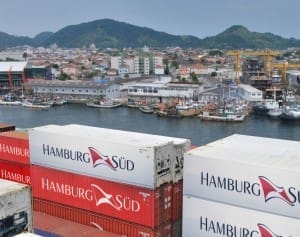ELEVEN Pacific-rim countries including Australia are set to sign the Trans-Pacific Partnership trade pact in March, with Australia’s Trade Minister Steve Ciobo promising a ‘brilliant deal’ for Australian exporters.
 The comprehensive trade agreement, going ahead despite the United States’ withdrawal last year, will see Australia join Canada, Mexico, Chile, Singapore, Malaysia, Vietnam and Brunei as signatorees to trade reforms.
The comprehensive trade agreement, going ahead despite the United States’ withdrawal last year, will see Australia join Canada, Mexico, Chile, Singapore, Malaysia, Vietnam and Brunei as signatorees to trade reforms.
The agreement was finalised at a meeting of trade officials in Tokyo yesterday, and is expected to be formally signed on March 8 in Chile.
The TPP hit a major obstacle last year, when a newly-elected US president Donald Trump pulled the US out of what he called a “horrible deal for the American worker.”
The agreement is designed to promote free trade between the Pacific nations involved by lowering tariffs and encouraging cheaper movement of labour.
Japan, Canada big wins for Aussie beef
For the Australian beef industry, the key benefits will be seen in Japan (already subject to the Japan-Australia bi-laterial Free Trade Agreement) and Canada, where rates of tariff will decline dramatically:
- Under the existing Japan trade agreement, Australia’s frozen exports were scheduled to decline to 23.5pc for chilled beef and 19.5pc for frozen, from 2028 onwards. But that now changes to a reduction to just 9pc on both frozen and chilled over the same 15-year time-schedule. In addition, processed red meat import tariffs (currently ranging from 6pc to 50pc, depending on the product) will be eliminated within 15 years; and the majority of offal tariffs will be eliminated within 10-15 years.
- In Canada, where Australian beef outside of the current 35,000t quota is currently tariffed at a rate of 26.5pc, that tariff rate above quota will now fall to zer0. The current 2.5pc tariff on sheepmeat will be eliminated immediately, when the agreement goes into force. In Mexico, the current 25pc beef tariff imposed on Australia will be eliminated within ten years, as well as the majority of offals.
Speaking during the World Economic Forum in Switzerland, trade minister Steve Ciobo said the TPP was a “brilliant trade deal” for Australia’s exports of all commodities.
He said a third of Australian exports went to the 10 countries involved and said the deal would eliminate 98 percent of tariffs in a marketplace worth close to $14 trillion.
“It hasn’t been easy, but we’re finally at the finish line and Aussie businesses will be the big winners,” he said.
Australian exporters will benefit from new free trade agreements with Canada and Mexico, and greater market access to Japan, Chile, Singapore, Malaysia, Vietnam and Brunei. There’s also a better deal for Australian beef exports into Japan.
The deal would not take effect in Australia until it passes through federal parliament.
Red meat industry welcomes agreement
The Australian red meat industry has welcomed the announcement about the renamed Comprehensive and Progressive Trans-Pacific Partnership.
“The CPTPP will lock in the market access commitments for the 11 parties for red meat products as negotiated in the original TPP outcome,” Red Meat Advisory Council chair Don Mackay said.
“The benefits will add significant value to the Australian red meat and livestock industry and complement the gains derived from the other free trade agreements Australia has concluded earlier,” he said.
Benefits from improved market access arrangements through the TPP are set to flow for the Australian red meat and livestock sectors in key red meat markets such as Japan, Mexico and Canada, Mr Mackay said.
“The implementation of the CPTPP agreement will also help to ensure that the Australian red meat supply chain remains internationally competitive, with more seamless trade rules, reduced costs and less red tape making it easier for our sector to respond to the growing consumer demand across much of the Asia-Pacific region.”
Upon entry into force, the CPTPP would initiate significant improvements to current access arrangements and generate new export opportunities, RMAC said in a statement. The CPTPP would deliver on the majority of the red meat industry’s priorities – via securing either a plurilateral reduction or elimination of import tariffs imposed (by CPTPP member countries) on our products in line with various implementation timeframes.
Mr Mackay congratulated the Australian Government on the achievement in securing the reforms after the US formally withdrew from the TPP discussions later last year.
“Thanks must go to the Minister for Trade, Tourism and Investment the Hon Steven Ciobo MP and his negotiating team for their efforts in what has been a difficult and protracted series of negotiations over the past couple of years – following the original conclusion of negotiations in October 2015.”
“The CPTPP is critical to the long-term positioning of Australian red meat globally and of acute importance is securing ratification and subsequent entry into force of the CPTPP as soon as possible,” Mr Mackay said.
“This will pave the way for future trade transformation should the CPTPP membership base widen.”
The Australian red meat and livestock industry has been an engaged and contributory party from the outset of the TPP/CPTPP process. It is anticipated the gradual reduction of this cost burden will positively impact the profitability of the Australian red meat supply chain as well as alleviate the inflated (tariff affected) prices paid for Australian red meat, livestock and associated products by CPTPP member country businesses and consumers.



HAVE YOUR SAY